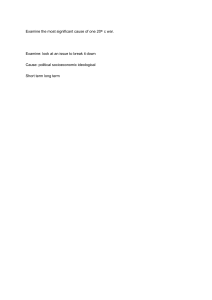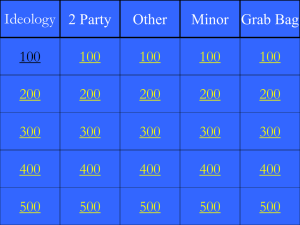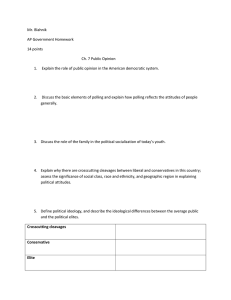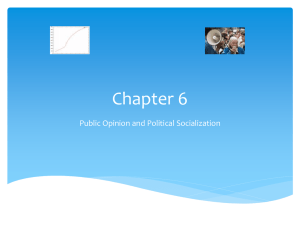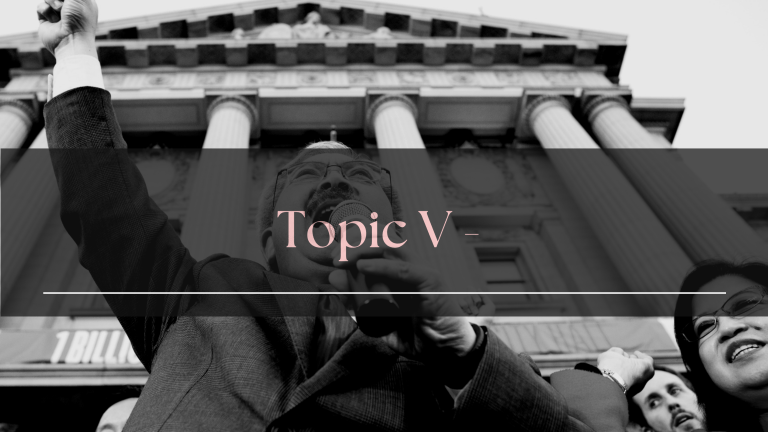
Topic V - OBJECTIVES 1. Define culture and political culture. 2. Discuss how socialization, major events and long term process can shape political culture over time. 3. Discribe the meaning of ideology and distinguish among several major ideological perspective. 4. Compare and contrast the features and development of the political cultures of the TIC cases 5. Explain the findings from the Research in context feature in this chapter. SSED 322 CULTURE Culture Is generally defined in two distinct but related ways. 1. Culture as a particular groups Underlying Values 2. As a system of meaning that shapes the way members of groups make sense of the people and events they encounter. POLITICAL CULTURE The term 'political culture' is used in the field of social science. It refers to historically-based, widely-shared beliefs, feelings, and values about the nature of political systems, which can serve as a link between citizens and government. It is the underlying set of values and beliefs about politics and the system of meaning for interpreting politics held by a given population. COMPONENTS OF POLITICAL CULTURE 1.Beliefs about Authority 2.Group versus Individual 3.Liberty versus Security 4.Political System Legitimacy 5. The political Community EVENTS , EXPERIENCES AND SOCIALIZATION Life experiences of individual whose values and systems of meaning compose a particular culture do not change that culture easily. Defining Events It can shock society and overwhelm the tendency of political culture to resist change. Repeated Experiences May affect political culture, particularly if they continent for years or decades . Political culture is also shaped through "Socialization" SOCIAL INSTITUTIONS Family Media Places of Worship Educational System Workplace Government GLOBALIZATION SOCIALIZATION POLITICAL CULTURE GLOBALIZATION Globalization is an avenue for socialization, with the Internet, Western films, and advertisements by multinational corporations tending to encourage consumerism, capitalism, and attachment to technology. Globalization serves as a transmission belt for culture by encouraging increased migration across political borders. SOCIALIZATION The process of transmitting components of a political culture to the next generation through social institutions, such as families, churches, and schools. Political socialization occurs as a nation’s citizen must have a patterned way of thinking about government. POLITICAL CULTURE It refers to a subset of the national culture as a whole reflection of a government, but it also incorporates elements of history and tradition that may predate the current regime. SSED 322 POLITICAL IDEOLOGIES: FROM VALUES AND SYSTEMS OF MEANING TO BLUEPRINTS One of the central parts of political culture is the set of values about how and how much society ought to be governed, which includes the role of government in the economy and other aspects of government penetration into society. Political Ideology is a set of beliefs or guiding principles about the proper functioning of politics and society. It is both normative and prescriptive, combining a sense of what ought to be with a blueprint for putting it in place. Fukuyuma proclaimed that the collapse of Communism meant the end of ideological struggles and thus "the end of history". Most social scientists believe that, to paraphrase Mark Twain, the reports of the death of ideology as a political force have been greatly exaggerated. Values about government and society are at the core of both political culture and ideology. Various combinations of political cultural components can yield distinct ideological categories. For example, ideological prescriptions that require a strong role for the central government would be opposed by a group that values social equality over difference to a dominant elite, prefers personal freedom to economic equality, places liberty above security and order, is suspicious of political leaders, and has a strong attachment to a regional identity at the expense of the overarching political community. One can use the concept of ideology to distinguish between types of regimes or to differentiate groups within a political system, including political parties. In the case of regimes, discussions of political systems of the during the cold war emphasized differences between Western-style democracy and the systems of the Communist states. Political systems may have official ideologies; Communist systems were known for their clear sets of guiding principles, even if countries like China have largely abandoned those principles today. In other systems, including many democracies, the ruling government may not lay out an ideology so explicitly. Yet, ideology can still be significant in such systems. Most democratic political parties link elites and the general population through "programmatic" appeals. In other words, the parties lay out their specific policy positions in pursuit of support at election time. These policy preferences are presented within a broader ideological framework. IDEOLOGICAL POSITIONS AND ECONOMICS • Political scientists understand that the state's ability to penetrate into society to extract economic resources is crucial for effective governing. But individuals whether politicians or members of the general public frequently dis agree on the proper extent to which government should infringe on personal freedoms or engage in the redistribution of income and wealth. • Economic issues like the redistribution of wealth and income provide a useful starting point for thinking about different ideological perspectives. • Progressive ideology is more appropriate for comparative politics. This position supports an active role for government in society and defends policies such as a strongly progressive taxation system that assists in the redistribution of income in society. • Social democratic ideology traditionally went a step further, supporting the nationalization of major industries in the economy but stopping short of the over throw of capitalism. Marxism focuses on control of the means of production and the use of the political system by the economically powerful to maintain their dominant position at the expense of the working class. Marxist ideologies advocate gaining control of the government in the name of the working class, collective ownership of prop- erty, and other aggressive actions to reduce exploitation and economic inequality • Conservative ideology, In the realm of economics, conservatives advocate smaller government, stronger property rights, less regulation of the economy, and decreased emphasis on income redistribution. • Libertarians emphasize a minimal role for government in all aspects of people's lives. They strongly oppose government policies designed to remake society, including efforts at income and wealth redistribution. Most politicians who run as Republicans in the United States hold conservative or libertarian ideological positions and support a free-market capitalist approach more than do Democrats, with little role for government in redistributing wealth and income. • Reactionary ideologies the return to traditional society, including the undoing of reforms meant to empower the lower classes. SSED 322 NON ECONOMIC IDEOLOGIES Ideologies do not focus exclusively on economics. Another major ideological division is social, often referred to in the United States as the “values questions”. Ideological left advocates unconventional lifestyles. greater tolerance Ideological right favors more traditional ways of life. of Libertarians tend to be more consistent in both realms, being highly suspicious of any government actions. Islamism is an ideology advocating Islamic law as the basis of government structure and policies as a way to immunize. Islamist gained control of governments in Afghanistan where they were subsequently forced from power and in a milder form, Iran. SSED 322 Migration from Mexico and Political Culture in Mexico A 2010 article in Comparative Political Studies by Clansa Pérez Armendariz and David Crow examined the extent to which migration from Mexico to the United States and Canada affects political beliefs and behaviors in Mexico. Based on an examination of survey data collected in Mexico in 2006, the authors conclude that migration from Mexico generates increases in political participation in Mexico, more tolerance of identity based and political differences, and more critical analysis of the shortcomings of Mexican democracy. 3201 Abcede, Michaella G. De Torres, Cris Nicole M. Peregrina, Charlote D. 3203 Arazo, Mellet B. Deri, Johanisa K. Mancilla, Lyka Mariell C. 3202 Bagos, Jhun Lee B. Bolivar, Krizia Charisse B. Tolentino, Joy R. 3204 Pomarejos, Ge-Ann J. Sangalang Nico Bryan M. THANK YOU FOR LISTENING!
